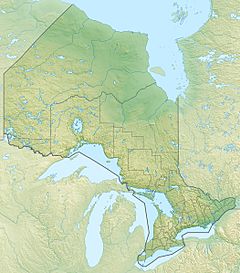Attawapiskat River facts for kids
Quick facts for kids Attawapiskat River |
|
|---|---|
|
Location of the mouth of the Attawapiskat River in Ontario.
|
|
| Native name | Êh-tawâpiskât sîpiy |
| Other name(s) | Kâh-tawâpiskâk |
| Country | Canada |
| Province | Ontario |
| Region | Northwestern Ontario |
| District | Kenora |
| Physical characteristics | |
| Main source | Attawapiskat Lake 241 m (791 ft) 52°09′32″N 87°35′45″W / 52.15889°N 87.59583°W |
| River mouth | Akimiski Strait, James Bay 0 m (0 ft) 52°58′00″N 82°15′40″W / 52.96667°N 82.26111°W |
| Length | 748 km (465 mi) |
| Basin features | |
| River system | James Bay drainage basin |
| Basin size | 50,500 km2 (19,500 sq mi) |
| Tributaries |
|
The Attawapiskat River is a long river in Ontario, Canada. It flows through Northwestern Ontario from Attawapiskat Lake all the way to James Bay. The river's name comes from the Swampy Cree language, meaning "Gap Between the Rocks."
Contents
Journey of the Attawapiskat River
The Attawapiskat River is about 748 kilometres (465 mi) long. It collects water from a very large area, known as its drainage area. This area covers about 50,500 square kilometres (19,498 sq mi) of land.
Where the River Starts
The river begins at Attawapiskat Lake. This lake is high up, about 241 metres (791 ft) above sea level. Several smaller rivers flow into Attawapiskat Lake. These include the Marten-Drinking River, the Otoskwin River, and the Pineimuta River.
Two Channels from the Lake
From Attawapiskat Lake, the river actually splits into two main paths. One is called the Attawapiskat River (the southern channel). The other is the North Channel. The North Channel is often easier for people to travel by canoe.
As the water flows out of the lake, the land drops quite a bit. The river moves from the higher, rocky ground of the Canadian Shield to the flatter, marshy Hudson Bay Lowlands. After some fast-moving sections called rapids, the North Channel joins back with the main Attawapiskat River.
River's Path to James Bay
The river then continues flowing east. Along its journey, other rivers join it. The Streatfeild River adds its water from the right side. Further downstream, the Muketei River joins from the left. The Missisa River also flows into the Attawapiskat from the right side.
Near the end of its journey, a part of the Attawapiskat's water flows into the Lawashi Channel. This channel then leads to the Lawashi River. The main Attawapiskat River continues past the community of Attawapiskat. Finally, it empties into James Bay at the Akimiski Strait, which is near Akimiski Island.
Amazing Rock Formations
Close to where the Attawapiskat River meets James Bay, you can see some amazing rock formations. The river has carved out tall, unique limestone islands. People who travel by canoe often call these formations the "Birthday Cakes" because of their layered look. These "Birthday Cakes" are special to this area. The Swampy Cree word for these rock gaps, tawâpiskâ, is where the river gets its name.
Diamonds Under the Ground
The area around the Attawapiskat River is also known for something special underground. It's called the Attawapiskat kimberlite field. This is a place where valuable diamonds can be found.
River's Importance and Economy
The Attawapiskat River is important for both nature and local jobs.
Otoskwin/Attawapiskat River Provincial Park
Parts of the river are protected within the Otoskwin/Attawapiskat River Provincial Park. This park helps keep the river and its surroundings natural and healthy.
Diamond Mining
Since 2008, a diamond mine called the De Beers Victor Diamond Mine has been operating near the river. This mine is located in the Attawapiskat kimberlite field. It is known for producing many diamonds each year.
Tributaries
- Missisa River (joins from the right)
- Muketei River (joins from the left)
- Streatfeild River (joins from the right)
- North Channel (joins from the left)
- Attawapiskat Lake (the source of the river)
- Otoskwin River
- Marten-Drinking River
- Pineimuta River
See also
 In Spanish: Río Attawapiskat para niños
In Spanish: Río Attawapiskat para niños
 | Claudette Colvin |
 | Myrlie Evers-Williams |
 | Alberta Odell Jones |


